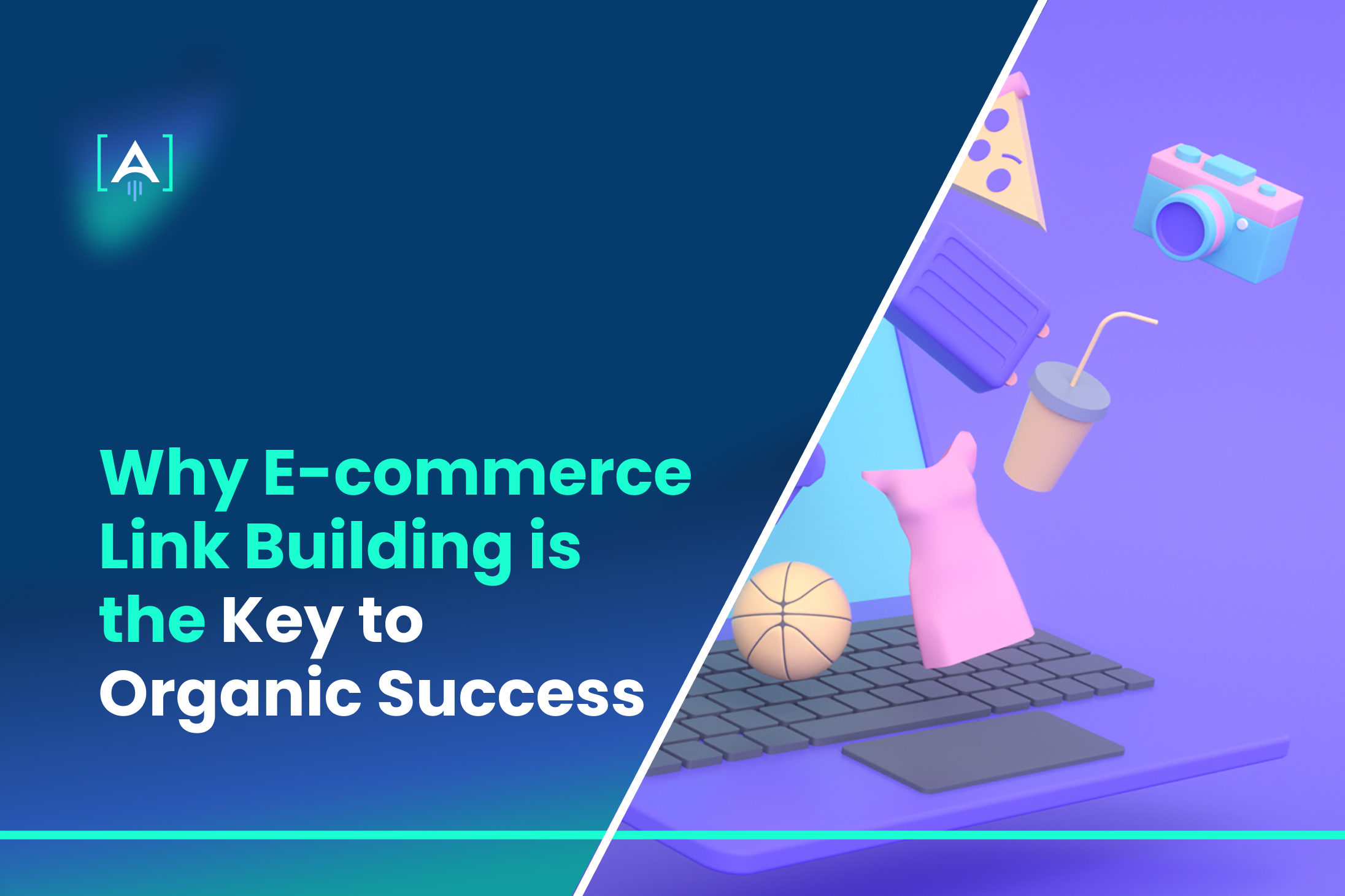You’ve crafted a stunning e-commerce site with top-notch products and seamless navigation.
Yet, the traffic? A trickle, not a flood. Why? Because, in the vast developments of the internet, even the best websites can lose into obscurity without one critical element—visibility.
This is where link building comes into play, acting as your compass to guide potential customers straight to your store.
According to Authority Hacker, 79.7% of SEOs consider link building an important part of their SEO strategy.
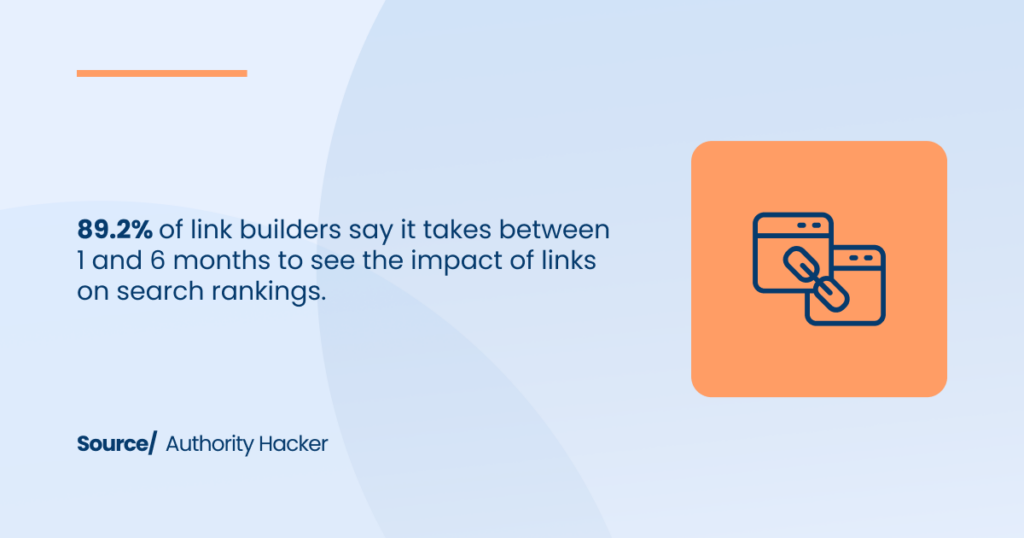
Link building is about trust, authority, and giving search engines a reason to rank your site above the competition.
A reliable E-Commerce Marketing Agency can navigate the complexities of link building, ensuring your site earns high-quality backlinks, driving both visibility and credibility.
Why Link Building is Essential
- Boosts Search Engine Rankings
- Drives Targeted Organic Traffic
- Builds Brand Trust and Authority
Let’s explore why link building is key to organic success and how it can transform your e-commerce site.
What’s the Big Deal? Why Link Building Outshines Other SEO Tactics
Link building is often compared to other SEO strategies, like on-page optimization and keyword placement.
But what makes it stand out?
Backlinks act as trust signals, vouching for your e-commerce store’s credibility in the eyes of search engines like Google.
While keywords and meta tags are essential, they only go so far. Google’s algorithms weigh backlinks heavily, making them a critical factor for improving domain authority and search rankings.
According to Ahrefs, 91% of web pages get zero organic traffic because they lack backlinks. That’s a staggering statistic for e-commerce sellers aiming to attract buyers.
Source: How many web pages get organic search traffic? Ahrefs
Is Link Building Just for SEO Nerds? Spoiler: It’s for Everyone
Many think of link building as something best left to SEO professionals.
But the truth is, it’s a strategy that benefits everyone in your business—CEOs, marketers, and sales teams alike.
Why? Because it directly impacts sales, visibility, and brand trust.
Imagine you’re a non-technical CEO running an e-commerce store. You might not care how Google algorithms work, but you do care about sales. Link building connects your store to credible sources, which brings in qualified traffic that converts. For example, when a top review site links to your products, visitors are not just browsing—they’re ready to buy.
For marketers, link building amplifies all their efforts. From ecommerce social media marketing to email marketing for ecommerce, every campaign benefits when traffic increases through quality backlinks. A simple mention on a popular blog can lead to a noticeable spike in visitors, giving your campaigns more reach.
And for entrepreneurs, it’s about building trust. Links from reputable sources tell potential buyers your brand is reliable, which is especially important for new or lesser-known stores.
Backlinks That Matter: The Secret Sauce for E-commerce Success
Not all backlinks are created equal.
A hundred links from low-quality sites won’t do what a single link from a trusted source can.
Google’s algorithm prioritizes quality over quantity, ensuring that e-commerce brands focusing on high-value backlinks see better results.
Why High-Quality Backlinks Matter
Google’s updates, like Penguin, penalize spammy backlinks while rewarding those from relevant and authoritative websites.
Source: Adam Connell
For e-commerce sellers, this means building relationships with niche blogs, industry influencers, and top publishers to earn meaningful links. A beauty e-commerce brand linked by Allure or Refinery29 will rank higher and attract loyal customers.
Statistics support this. HubSpot reports that companies with a blog generate 97% more inbound links, proving that creating useful content and earning quality links is a long-term investment.
How Backlinks Create a Sales Funnel, You Didn’t Know You Needed
Backlinks don’t just bring visitors—they bring qualified leads.
Think of them as the first step in your sales funnel. When someone clicks a link to your site from a trusted source, they already have confidence in your brand.
Customer Trust
Let’s say your e-commerce store is linked by a respected ecommerce analytics blog discussing the best tools for online sellers. Visitors arriving from that link are not just random clicks; they are highly targeted users who trust the source and are likely to explore your offerings.
Reduced Bounce Rates
When backlinks come from relevant sites, visitors find what they expect when they land on your page. This reduces bounce rates and improves metrics that Google uses to determine rankings.
Brand Credibility
Every backlink from a respected source enhances your brand’s credibility. If a mobile commerce expert links to your store, customers will likely see you as a leader in your niche.
How to Build Links Without Losing Your Budget
Building backlinks can feel like a never-ending task, but it doesn’t have to drain your time or wallet.
Cost-effective strategies and smart planning can help you build a strong backlink profile without breaking the bank.
Cost-Effective Link-Building Strategies for E-Commerce Brands
- Write Guest Posts
- Reach out to niche blogs or industry websites. Offer valuable content in exchange for a backlink.
- Focus on blogs that cater to your audience to maximize traffic and boost your credibility.
- Example: If you run a home decor e-commerce store, contribute a post about “Trendy DIY Wall Art” to a lifestyle blog.
- Partner with Non-Competing Businesses
- Collaborate with complementary brands to cross-promote content. For example, a pet food store could collaborate with a pet grooming service to share blog posts or create a co-branded guide.
- Turn Customer Reviews into Backlinks
- Request satisfied customers to review your products on their blogs or platforms. Include a link to your store in their review.
- Monitor and Reclaim Unlinked Brand Mentions
- Use tools to find mentions of your brand without a link. Politely ask the site to include a hyperlink.
Hack Your Way to Backlinks: Gamification and Giveaways
Who doesn’t love free stuff or a fun challenge? Gamified campaigns and giveaways are excellent ways to earn backlinks while engaging your audience.
How to Use Gamification for Backlinks
- Create an interactive quiz, game, or challenge that aligns with your products.
- Example: A fitness e-commerce store could launch a “30-Day Workout Challenge” with a free download or prize for participants who complete it. Encourage participants to share the challenge on their websites or blogs with a link to your page.
Run a Product Giveaway
- Offer your product as a prize in a giveaway. Ask participants to share the giveaway on their websites or blogs for an additional entry.
- Collaborate with bloggers or influencers who host giveaways to increase visibility and backlinks.
Leverage Loyalty Programs
- Create a referral program that rewards customers for promoting your products through backlinks. A simple incentive like a discount or freebie can motivate them to link to your store.
The Social Side of Link Building: Why Reddit and TikTok Matter
Social media platforms aren’t just for entertainment—they’re powerful tools for ecommerce link-building.
Reddit and TikTok, in particular, offer untapped potential for earning organic backlinks.
Reddit: The Front Page of Link Opportunities
- Participate in relevant subreddits to share your expertise and resources.
- Example: If you sell eco-friendly products, join a subreddit like r/ZeroWaste and share a helpful guide or product comparison that links to your website.
- Be authentic and avoid overtly promotional content, as Reddit users value genuine contributions.
TikTok: Viral Backlinks Made Simple
Source: Backlinko
- Post engaging, informative content that’s shareable. For example, create a “How to Use This Product” video with a call-to-action encouraging users to check the link in your bio.
- Partner with TikTok influencers who can direct their audience to your site.
- Use trending challenges or hashtags to amplify your reach.
Don’t Forget Niche Communities: Small Groups, Big Results
Sometimes, the best backlinks come from tight-knit communities where trust and relevance matter most.
Niche forums, industry-specific Facebook groups, and even Slack channels can be goldmines for link building for e-commerce.
Where to Find Niche Communities
- Industry-Specific Forums: Participate in discussions, answer questions, and share relevant links. For example, if you sell photography gear, join a forum like DPReview to share expert tips and links to your products.
- Facebook Groups: Join groups related to your industry and contribute value. Avoid spamming; instead, share helpful content that naturally includes links to your site.
- Slack or Discord Communities: Many professional groups on these platforms discuss tools and resources. If your product fits the conversation, share a link.
Why These Communities Work
- Members trust recommendations within these groups more than generic ads.
- The audience is often highly targeted, increasing the likelihood of traffic and conversions.
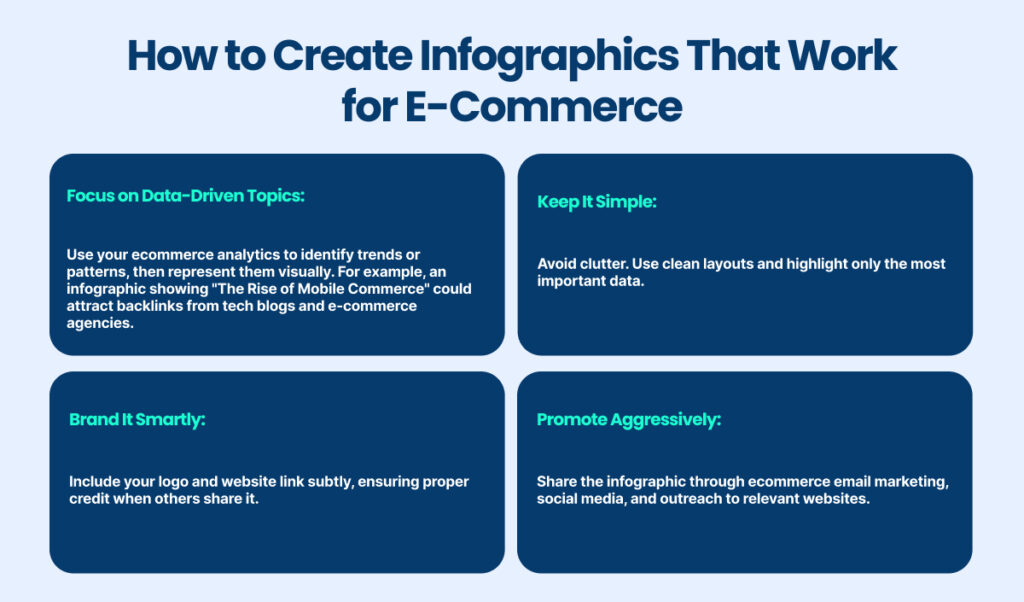
Beyond Blogs: Unexpected Content That Attracts Links Like a Magnet
When you think about e-commerce link building, blogging might be the first tactic that comes to mind.
But a whole world of engaging unexpected content formats can help attract high-quality backlinks.
Tools, quizzes, calculators, and other interactive content capture user interest and serve as resources other sites love to link to.
Infographics: The Most Shareable Content Format
Infographics are like visual storytelling.
They break down complex ideas into bite-sized, easy-to-digest graphics that grab attention.
For content marketing for ecommerce, infographics are gold because they’re highly shareable and provide an opportunity for backlinks from blogs, news outlets, and social media.
Why Infographics Attract Backlinks
- Easy to Share: Other websites can embed them in their content with a link back to your site as the source.
- Highly Informative: They provide valuable information quickly, which makes them ideal for time-strapped readers.
- Attention-grabbing: Bright visuals and bold text naturally draw users in.
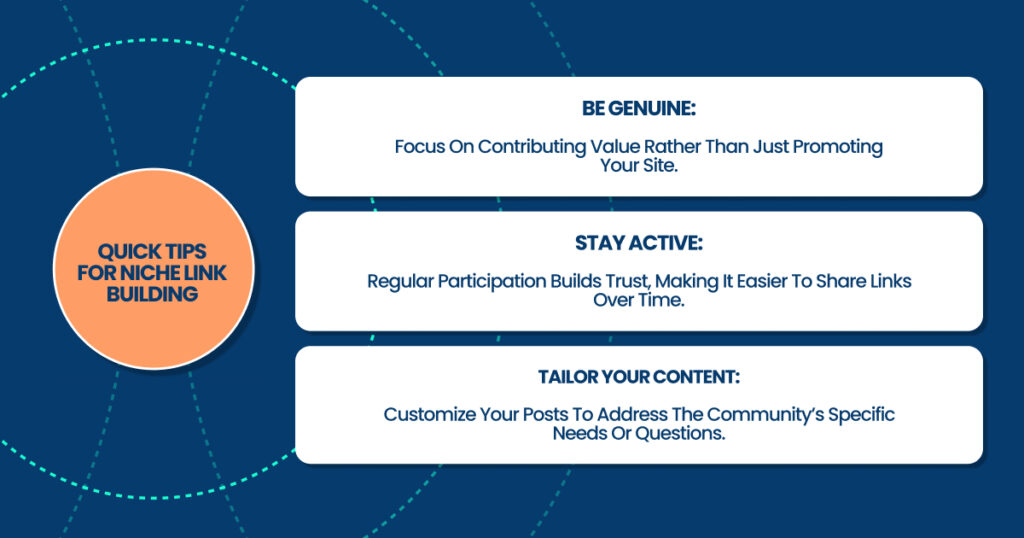
Example: If you’re running an online pet store, an infographic titled “What Your Dog’s Diet Should Look Like” with engaging stats and visuals could gain backlinks from pet blogs and forums.
Interactive Tools: Let Your Website Do the Heavy Lifting
Interactive tools are like mini assistants that solve problems for your customers.
They’re incredibly effective for e-commerce link building because they provide value other websites eagerly reference. When you create tools that address specific needs, they become a resource worth linking to.
Types of Tools That Work for E-Commerce
- ROI Calculators:
- Example: If you’re selling energy-efficient appliances, create a calculator that shows customers how much money they’ll save in the long run.
- Why it Works: Financial blogs and sustainability websites will likely link to tools like this as a helpful resource.
- Product Recommendation Quizzes:
- Example: An online skincare store could offer a quiz titled “Find the Perfect Product for Your Skin Type.�”
- Why it Works: Quizzes engage users and simplify their shopping experience, while other blogs link to your quiz as a unique feature.
- Interactive Timelines:
- Example: A fashion retailer could showcase a timeline of how trends have evolved and tie it to their product line.
- Why it Works: It creates a narrative around your brand that lifestyle and fashion bloggers love to reference.
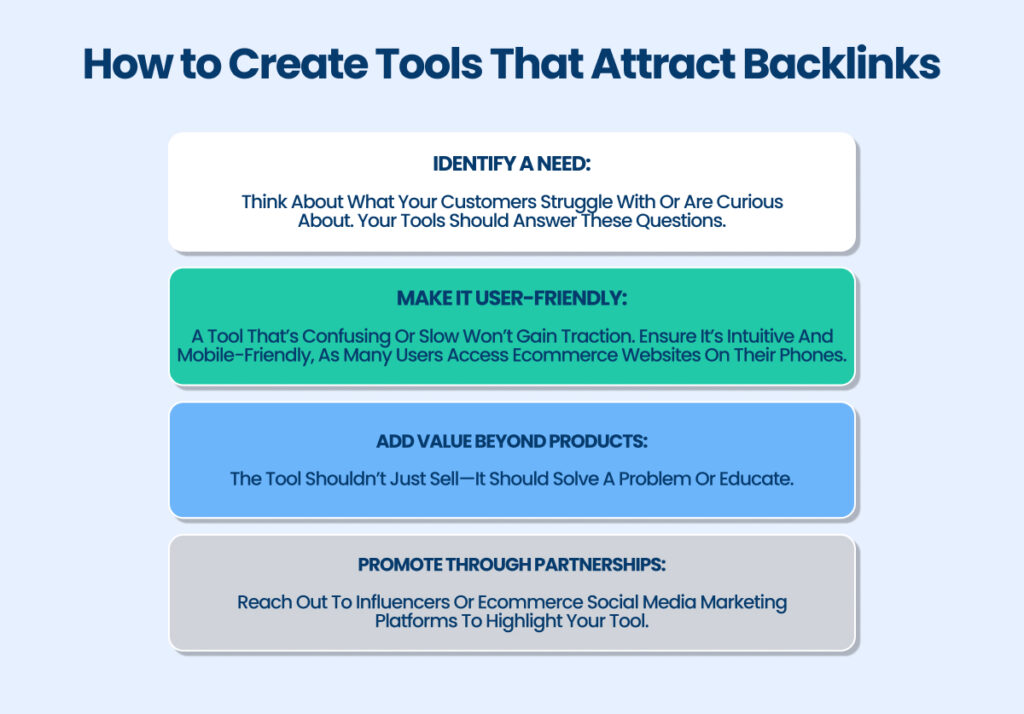
Example: A furniture e-commerce store could create a “Room Layout Planner” tool. Interior design blogs, home improvement forums, and even facebook ads for ecommerce campaigns can link to the tool, helping you build backlinks while attracting interested customers.
New-Age Link Building: How AI and Automation Can Change the Game
In the evolving world of ecommerce link building, staying efficient without sacrificing quality is key.
This is where AI and automation step in, turning what was once a manual, time-consuming process into something smarter and more effective.
From personalized outreach to uncovering hidden opportunities, AI is reshaping how businesses approach link building.
AI-Powered Outreach: Stop Sending Spam, Start Building Relationships
Email outreach is a cornerstone of link building for ecommerce, but there’s a fine line between building relationships and flooding inboxes with spam.
Source: Size of the global industrial automation market from 2020 to 2025, Statista
AI tools make outreach smarter by adding a personal touch.
How AI Improves Email Outreach
- Personalization at Scale
- Instead of sending generic emails, AI tools analyze recipient profiles to craft resonate messages. For instance, if you’re reaching out to a blog about sustainable fashion, the tool can include references to their recent articles or interests.
- This personalized approach leads to higher response rates, as people are likelier to engage with genuine emails.
- Effortless Prospecting
- AI tools help identify contacts by scanning websites, social media, and even marketing e commerce campaigns.
- For example, Respona can find email addresses of editors or site owners who frequently publish content relevant to your niche, such as “eco-friendly product reviews” or “top home decor trends.”
- Follow-Up Automation
- AI optimally schedules and sends follow-up emails, ensuring no opportunity slips through the cracks.
- These follow-ups are tailored to the recipient’s behavior, referencing whether they opened the previous email or clicked on your link.
Example: If your store sells gourmet kitchenware, you should contact food bloggers.
Using BuzzStream, you can automate finding relevant blogs, craft a message mentioning their recent recipe posts, and include a link to your “Best Kitchen Tools of 2024” guide. This type of outreach feels personal, even though AI powers it.
Predictive Analytics for Link Opportunities
Finding the right websites to target for backlinks is often like searching for a needle in a haystack.
Predictive analytics changes that by using AI to identify which sites are most likely to link to your content. This isn’t guesswork—it’s data-driven insight.
How Predictive Analytics Works
- Analyzing Historical Data
- AI looks at websites that have linked to similar content or competitors in the past. For example, if a site frequently links to “top-rated fitness gear,” it might also be interested in your “Best Yoga Accessories for Beginners” article.
- Scoring Opportunities
- Tools assign a score to each potential site, ranking them based on domain authority, relevance, and likelihood of linking to your content.
- This saves time by helping you focus only on high-value targets.
- Spotting Trends
- AI identifies emerging topics and trends that align with your business. For example, if “sustainable packaging” is gaining traction, it might suggest creating a guide or infographic to attract backlinks from environmental blogs.
Example: Let’s say you run an online furniture store. A predictive analytics tool might identify that interior design blogs frequently link to articles about “maximizing small spaces.” This insight could inspire you to create a resource titled “5 Space-Saving Furniture Ideas for Small Apartments” and target those blogs for backlinks.
Why AI Makes Sense for E-Commerce Link Building
- Saves Time: Instead of manually researching and contacting hundreds of sites, AI does the heavy lifting, allowing you to focus on creating great content.
- Improves Accuracy: AI eliminates the guesswork, ensuring your efforts are directed toward websites relevant to your business.
- Boosts ROI: By focusing on high-quality prospects, AI helps you earn backlinks that drive real traffic and improve rankings—making your ecommerce cro efforts more effective.
Conclusion: Building Bridges to E-Commerce Success
Effective ecommerce link building combines creativity, data-driven strategies, and consistent effort to ensure long-term visibility and success. Each backlink acts as a bridge, connecting potential customers to your store while signaling to search engines that your site is trustworthy and worth ranking.
Who else, if not [A] Growth Agency, will be your contributor? Our specialists will set the most creative strategies.
Growth is our driving force. At heart, we’re a team of data-driven growth marketers focused on delivering scalable results!
This should tell you more!
